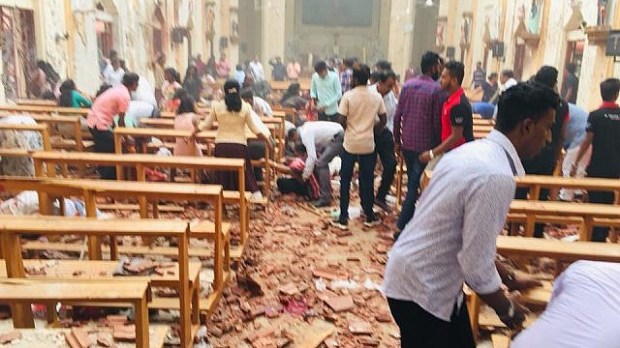Lenten Campaign 2025
This content is free of charge, as are all our articles.
Support us with a donation that is tax-deductible and enable us to continue to reach millions of readers.
A little-known terrorist organization is being blamed for Easter Sunday’s attack on churches and hotels in Sri Lanka that left nearly 300 people dead and hundreds wounded.
Suicide bombers caused death and destruction in churches as Christians gathered for what should have been a joyful celebration, the feast of the Resurrection of the Lord.
What now appears to be a series of coordinated bombings began at a shrine dedicated to St. Anthony of Padua in Colombo, the capital, around 8:45 a.m. local time.
“Minutes later a second suicide blast shattered the Sunday brunch tranquillity at the Shangri-La Hotel’s Table One Restaurant, a favorite of foreign tourists,” the New York Times reported. By the time the attacks were over, there was carnage at three churches (two of which are Catholic) and three upscale hotels in Colombo and other parts of the island nation.
The first four bombs went off at roughly the same time, with two others coming within 20 minutes, the South China Morning Post reported. Another explosion occurred at a fourth hotel an a house where police were questioning a suspect in the afternoon.
As of Monday, the death toll stood at 290. The deadliest attack occurred at St. Sebastian’s Catholic church in Negombo, a city about 20 miles north of Colombo. At least 104 people were killed there. And at least 28 people were killed when a suicide bomb went off in Zion church in the eastern city of Batticaloa.
Cardinal Malcolm Ranjith, the archbishop of Colombo, canceled all Easter Masses for the rest of the day.
The emergency continued into Monday, when another blast occurred on a street near a church in Colombo. Police were attempting to defuse explosives in a vehicle used by the attackers when it blew up, the BBC reported.
Though no one has claimed responsibility, the government on Monday blamed a local radical Islamist terror organization called National Thowheeth Jama’ath. “The group has no history of large-scale attacks but came to prominence last year when it was blamed for damaging Buddhist statues,” said the BBC.
Authorities said they were holding 24 suspects in connection with the bombings.
Questions arose about the government’s alleged failure to act on intelligence that warned of the attacks. A cabinet spokesman, Rajitha Senaratne, said at a press conference that authorities were warned about a threat from National Thowheed Jamath two weeks ago, said the BBC. He said that the warnings were not passed on to the Prime Minister, Ranil Wickremesinghe, or his cabinet. Wickremesinghe acknowledged that security services had been “aware of information” but had not acted on the information.
The BBC added:
Senaratne said that authorities believed the bombers had international support. “We do not believe these attacks were carried out by a group of people who were confined to this country,” he said, adding: “There was an international network without which these attacks could not have succeeded.”
Though the vast majority of victims were Sri Lankan nationals, the ministry of foreign affairs says it believes 35 foreign nationals were killed. That included three of the children of Danish billionaire Anders Holch Povlsen, and citizens of Great Britain, including two with dual U.S. citizenship; India, Portugual, Turkey, China, Australia, the Netherlands, and Japan.
A British family vacationing in Sri Lanka lost three of its four members. Ben Nicholson was the only survivor in the bombing at the restaurant of the Shangri-La hotel in Colombo. Anita Nicholson, a 42-year-old lawyer, her son, Alex, 11, and daughter, Annabel, were killed.
The education publishing company Pearson said its employee Dieter Kowalski of Colorado was killed, the first US national to be named among the dead, the Guardian reported.
The Archdiocese of Colombo said in a statement that Cardinal Ranjith will preside at a “common funeral” on Tuesday for all the victims of the attack at the two Catholic churches.
Sri Lanka is a majority Buddhist country, with about 70 percent of the population adhering to that religion. Hindus make up about 13 percent, Muslims 10 percent, Roman Catholics 6 percent, and other Christians 1 percent.

